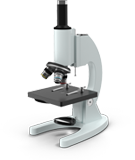Orders placed after 2:00 pm Dec. 22nd will be shipped Dec. 27th and orders placed after 2:00pm Dec. 29th will be shipped January 3rd.
Balantidium coli, though rare in the US, is an intestinal protozoan parasite that can infect humans. These parasites can be transmitted through the fecal-oral route by contaminated food and water. Balantidium coli infection is mostly asymptomatic, but people with other serious illnesses can experience persistent diarrhea, abdominal pain, and sometimes a perforated colon. When traveling to endemic tropical countries, Balantidium coli infection can be prevented by following good hygiene practices. Wash all fruits and vegetables with clean water when preparing or eating them, even if they have a removable skin.
Balantidium infection in humans is rare in the United States. However, Balantidium is more common among pigs in warmer climates, and in monkeys in the tropics. Infection in humans is therefore also more common in those areas, especially if good hygiene is not practiced. Balantidium coli is found throughout the world, but it is most prevalent in tropical and subtropical regions and developing countries.
Balantidium coli is transmitted through the fecal-oral route. Humans can become infected by eating and drinking contaminated food and water that has come into contact with infective animal or human fecal matter. Infection can occur in several ways, including the following examples: eating meat, fruits, and vegetables that have been contaminated by an infected person or contaminated by fecal matter from an infected animal, drinking and washing food with contaminated water, or having poor hygiene habits.
Balantidium coli is an intestinal protozoan parasite that causes the infection called balantidiasis. While this type of infection is less common in the United States, humans and other mammals can become infected with Balantidium coli by ingesting infective cysts from food and water that is contaminated by feces. Mostly asymptomatic, Balantidium infection can cause such symptoms as diarrhea and abdominal pain.
Balantidium coli is an intestinal protozoan parasite that causes the infection called balantidiasis. While this type of infection is less common in the United States, humans and other mammals can become infected with Balantidium coli by ingesting infective cysts from food and water that is contaminated by feces. Mostly asymptomatic, Balantidium infection can cause such symptoms as diarrhea and abdominal pain.
Balantidium coli is an intestinal protozoan parasite that causes the infection called balantidiasis. While this type of infection is less common in the United States, humans and other mammals can become infected with Balantidium coli by ingesting infective cysts from food and water that is contaminated by feces. Mostly asymptomatic, Balantidium infection can cause such symptoms as diarrhea and abdominal pain.
Balantidium coli is an intestinal protozoan parasite that causes the infection called balantidiasis. While this type of infection is less common in the United States, humans and other mammals can become infected with Balantidium coli by ingesting infective cysts from food and water that is contaminated by feces. Mostly asymptomatic, Balantidium infection can cause such symptoms as diarrhea and abdominal pain.
Balantidium coli is an intestinal protozoan parasite that causes the infection called balantidiasis. While this type of infection is less common in the United States, humans and other mammals can become infected with Balantidium coli by ingesting infective cysts from food and water that is contaminated by feces. Mostly asymptomatic, Balantidium infection can cause such symptoms as diarrhea and abdominal pain.
Balantidium coli is an intestinal protozoan parasite that causes the infection called balantidiasis. While this type of infection is less common in the United States, humans and other mammals can become infected with Balantidium coli by ingesting infective cysts from food and water that is contaminated by feces. Mostly asymptomatic, Balantidium infection can cause such symptoms as diarrhea and abdominal pain.
Balantidium coli is an intestinal protozoan parasite that causes the infection called balantidiasis. While this type of infection is less common in the United States, humans and other mammals can become infected with Balantidium coli by ingesting infective cysts from food and water that is contaminated by feces. Mostly asymptomatic, Balantidium infection can cause such symptoms as diarrhea and abdominal pain.
For more information view the source: Center for Disease Control
Recommended Test: Full GI Panel
Recommended Product: Freedom Cleanse Restore Parasite Cleanse
ABOUT PARASITOLOGY CENTER, INC
Parasitology Center, Inc. (PCI) in Scottsdale, Arizona is a research facility of parasites of the intestinal tract and organ systems.
WHAT’S NEW
06/23/21: 6/23/21: WHAT IS A PARASITE CLEANSE?

Phone: 480-767-2522
Email: [email protected]
Hours: 7:30am to 4:00pm
Monday through Thursday.
Hours: 7:30am to 1:00pm
on Friday.
Closed Saturday - Sunday.
PARASITETESTING.COM © 2015 | Policies & Procedures | Terms And Service




